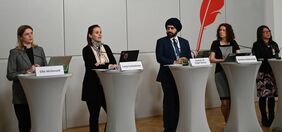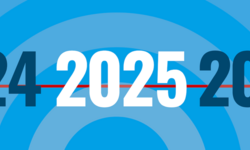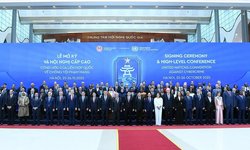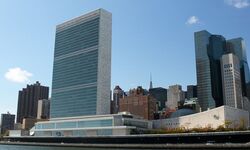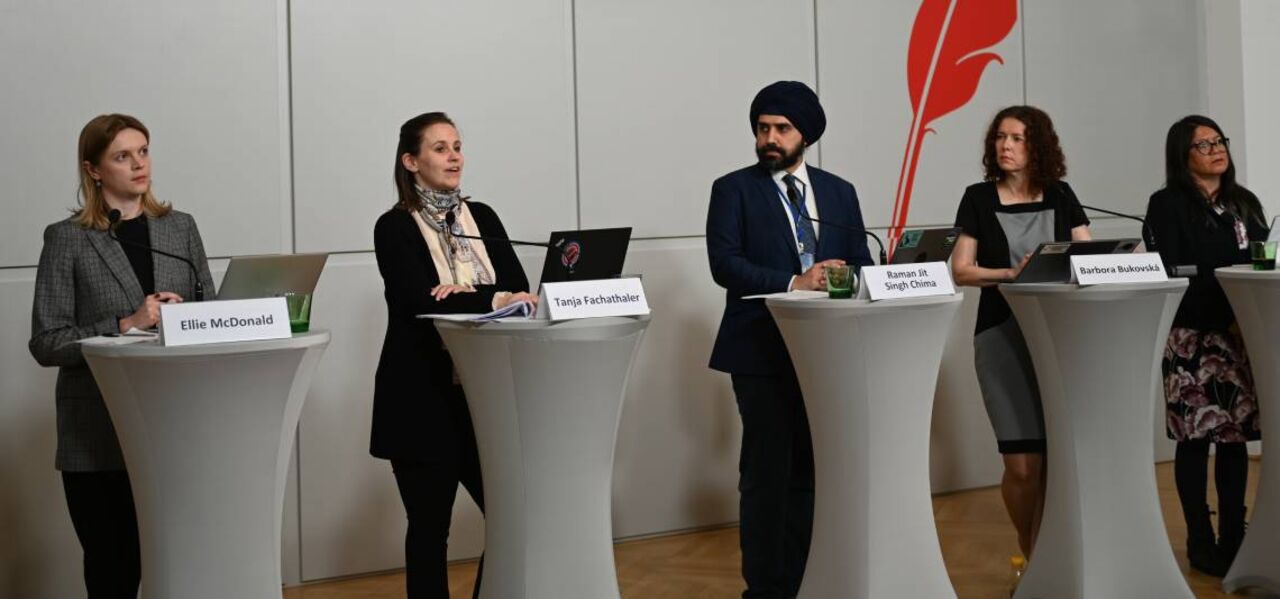
UN Cybercrime Convention – Our Campaign for a Better Treaty
UN Cybercrime Convention – The Talks Continue
Back in January we published a blogpost explaining what to expect from the UN Cybercrime Convention negotiations in Vienna, Austria.
Now, the fifth round of talks (11 – 21 April 2023), held at the UN’s Vienna Office, has concluded. Tanja Fachathaler, policy advisor at epicenter.works, and Thomas Lohninger, our executive director, attended the negotiations every day because many items in the convention could curtail our digital rights substantially in the future. As part of a strong coalition with some of the largest digital rights NGOs in the world we got involved, held events, made submissions and spoke before the delegates to prevent such an outcome.
Significance of the Treaty
The UN Cybercrime Convention has the potential to rewrite penal codes all over the world. It creates an international standard for surveillance legislation in states and specifies what constitutes crimes when the tool used is a computer. But the biggest change could be in how states access personal data, as the convention creates worldwide norms on how law enforcement agencies will cooperate with their counterparts in other countries.
We have accompanied this process for quite some time. Prior to the start of the fourth round of negotiations we co-signed a joint open letter by 89 NGOs from 45 countries that offered concrete suggestions to improve the treaty text. The recent meeting of stakeholders and nations in Vienna has been the fifth round of negotiations. The process has now entered its most critical stage.
193 states are represented at the UN plenary. We spoke several times and presented concrete suggestions for changes to the delegates. In the margins, informal talks took place, and alliances were formed and strengthened. On Wednesday, 12 April 2023, we organised a civil society dinner together with our partner NGOs and were able to talk to some 60 government representatives from 20 countries about the importance of human rights to the negotiations. The dinner went very well and we feel it succeeded in providing a counterweight to the demands made by Interpol and others.
On Thursday, 13 April 2023, we held a press conference at Presseclub Concordia in Vienna, again cooperating with four of our partners, the Electronic Frontier Foundation, Access Now, Article 19 and Global Partners Digital. With this hybrid (on- and offline) press event we wanted to give the negotiations the public spotlight the convention deserves. Far-reaching matters like this should not be decided without the scrutiny of the wider public.
Footage from our press event at Presseclub Concordia:
We hope that our criticism and suggestions for improvement will be incorporated into the UN Cybercrime Convention. As part of a large coalition of strong civil society organisations our goal is the protection of human rights in the final convention. With this aim, we also organised an evening event with delegations and civil society representatives during the intensive weeks of negotiations. The treaty simply must not undermine data privacy around the world or force Europe to give up its high standards of protection.
Different Views and Participation
The negotiations were every bit as suspenseful as a crime movie. It is in the nature of things that reaching an agreement on such far-reaching issues across cultural barriers is not easy. But sometimes the real problem emerges clearly despite the carefully worded diplomatic language. Egypt for instance was concerned by the frequent mention of the term “human rights”. A query was raised why the term appears so frequently in the convention and what it has to do with the subject of cybercrime. Russia used the stage at the United Nations despite the tight schedule for a speech in the manner of a good filibuster that was less about the subject at hand and more about the role of the UN in international relations per se. But at least nowadays NGOs and civil society are admitted to the process. This is major progress compared to earlier negotiations, when only political representatives were debating such fundamental treaties.
On three occasions, we had the opportunity to speak. Policy advisor Tanja Fachathaler had several minutes on 17 April to present (YouTube) our concerns regarding Chapter IV (“International Cooperation”). On 18 April, in another intervention she raised issues (YouTube) with Chapter V (“Technical Assistance”), and on 20 April her statement (YouTube) on the Preamble made it clear that the convention must not fall short of existing human rights standards anywhere in the text.
To add emphasis to the urgency of our demands, towards the end of the fifth round of negotiations we also wrote a joint letter together with thirteen other human rights NGOs and human rights experts to the Ad Hoc Committee.
What Makes This Treaty so Important?
The UN Cybercrime Treaty, as the convention is also known, is an important instrument for governing how criminal law enforcement agencies behave in connection with data sharing, enforcement and crimes in the digital sphere (cybercrime) when cooperating internationally. At present, these matters are governed by the Budapest Convention from 2001. Needless to say, this document is no longer up to the task given today’s technical standards. Therefore it is vital to come to an agreement that is accepted by all and safeguards data privacy and human rights – and most of all: a convention that exceeds the fairly low data privacy and human rights standards of the old convention.
This is a shared international issue that has shaped our collaboration with other NGOs. One result of this was a Spanish-language press conference at our offices on 18 April 2023.
We will keep campaigning for our goals and will keep you updated.
Since you're here
… we have a small favour to ask. For articles like this, we analyse legal texts, assess official documents and read T&Cs (really!). We make sure that as many people as possible concern themselves with complicated legal and technical content and understand the enormous effects it has on their lives. We do this with the firm conviction that together we are stronger than all lobbyists, powerful decision makers and corporations. For all of this we need your support. Help us be a strong voice for civil society!
Become a supporter now!
